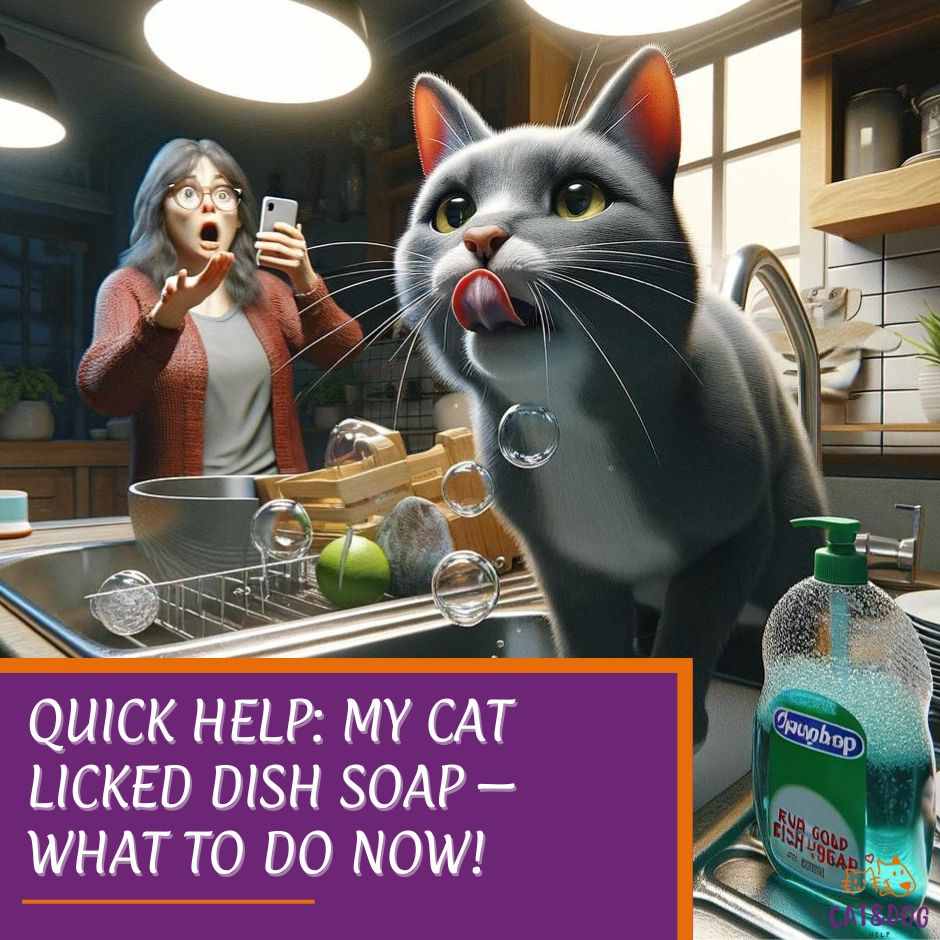If you’re a cat owner, you might have caught your furry friend in a sudsy situation — licking dish soap.
Why do our whiskered companions find cleaning products so alluring, you wonder?
Well, it’s not the soap’s cleaning prowess they’re after; sometimes, it’s just feline curiosity or the tracing of food scents on dishes that leads to an unintended taste test.
However, as harmless as a few bubbles might seem to watch tumble off your cat’s whiskers, ingesting dish soap can actually be quite harmful to our little predators.
It turns out that common dish soap ingredients, such as detergents, can spell trouble for a cat’s delicate digestive system.
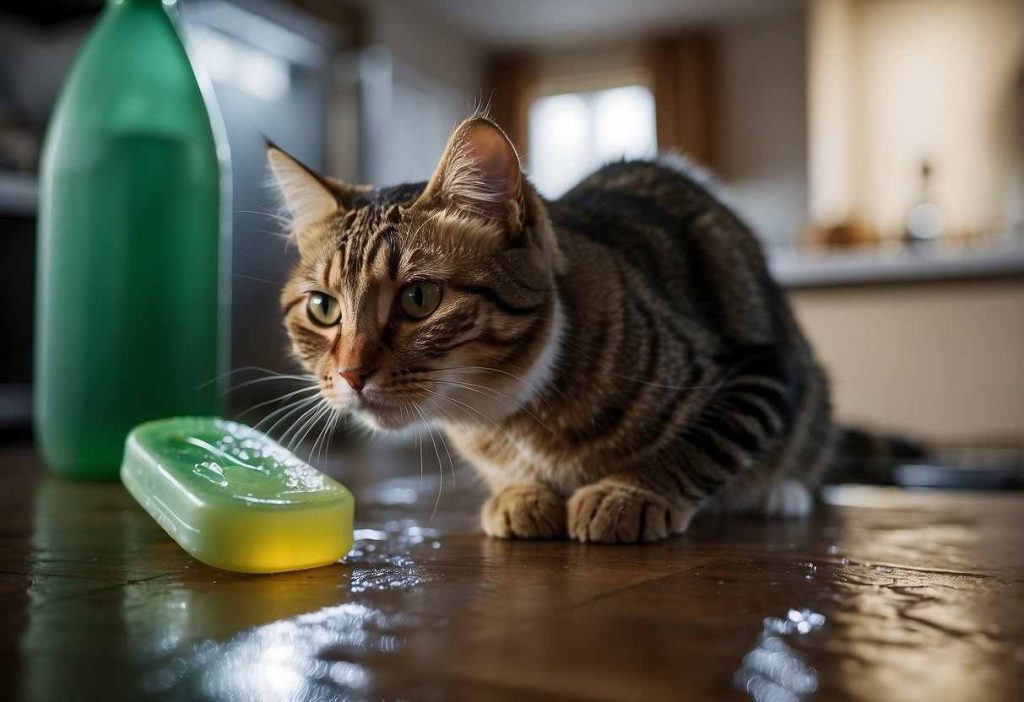
Gastrointestinal upset, which includes symptoms such as vomiting, diarrhea, and a decrease in appetite, can occur after the cat ate food he shouldn’t have tried.. (1)
So, even if you spot your cat going to town on a soapy plate, don’t let those cute, bubble-blowing moments fool you.
Taking swift action is important; plus, knowing what to do next can help prevent your pet from a soapy slip-up again.
This article will arm you with all the know-how you need: from understanding why dish soap, or any detergent, poses risks for cats, through to steps to take immediately after your cat has ingested soap, to preventing future bubbly encounters with Dawn dish soap.
Remember, even though dish soap is listed as a non-ionic detergent, it can still be harmful to your cat if ingested. (2)
It is important to monitor your cat and seek veterinary attention if they experience coughing, vomiting or diarrhea.. If you are unsure of what to do, it is always best to consult your local vet for advice.
Key Takeaways
- Ingesting dish soap can cause gastrointestinal upset in cats. (3)
- Immediate action can reduce soap ingestion risks and symptoms.
- Preventive measures are crucial to keep cats safe from soap exposure.
My Cat Licked Dish Soap: Immediate Response
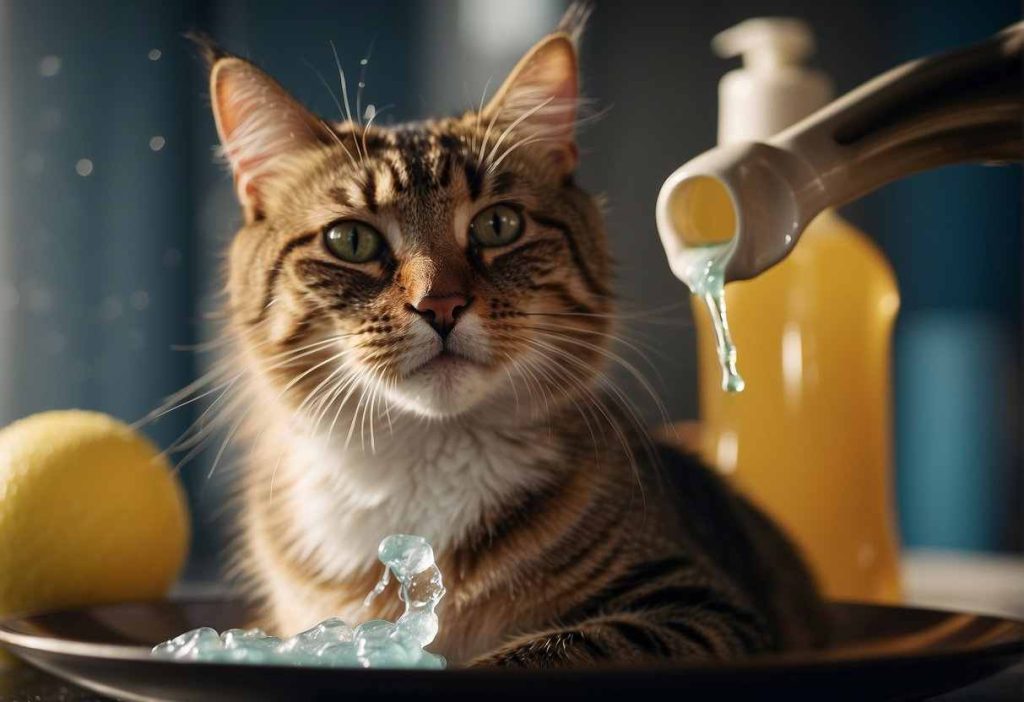
First Things First:
- Evaluate how much was ingested. If it was a mere lick, that’s less concerning than a gulp.
Next up:
- Rinse the Mouth: Gently flush your cat’s mouth out with water to dilute any remaining soap.
- Offer Water: Provide clean, fresh water to drink, and encourage hydration to help flush out the soap ingested.
- Observe Your Cat: Watch your cat for the next few hours. Symptoms such as vomiting, diarrhea, excessive drooling, or changes in behavior could indicate irritation or a mild reaction to the soap.
- Don’t Induce Vomiting: It might seem intuitive, but inducing vomiting isn’t the best idea—it can do more harm than good.
Symptoms to Watch For:
- Sneezing
- Coughing
- Sneezing
If you notice any of the following issues, it’s time to call the vet:
- Continuous vomiting
- Extreme lethargy
- Difficulty breathing (4)
Remember, your quick and calm response can make a world of difference. And hey, after this, consider securing your soap somewhere your cat can’t reach.
Alongside safeguarding your cat from dish soap, it’s crucial to keep an eye out for other feline foreign objects around the house that could catch your cat’s curiosity, ensuring their environment remains as safe as possible
They’re curious creatures, but their nine lives don’t need a soapy test!
Vet Insights on Dish Soap and Cats
In case your cat has a little more than a lick, experts suggest watching for symptoms such as:
- Vomiting
- Diarrhea
- Excessive drooling
- Lack of appetite
Ever face the “to call or not to call the vet” dilemma? If you notice any of the above, it’s time to ring up your vet for some advice.
They might recommend giving your cat small amounts of water or milk to dilute the soap remnants.
Remember, prevention is key! Make keeping your cat safe a cinch by:
- Storing dish soap out of reach
- Rinsing dishes thoroughly post-wash
- Checking that your cat’s water bowl is their only water source
A little expert insight goes a long way to keep our furry little friends healthy, happy, and far away from soap-tasting adventures.
Usually, the symptoms of a cat eating something it shouldn’t eat will experience symptoms that are almost the same as those above.
So as paw-rents, you have to pay more attention to the items in your house so that you don’t get careless and your cat steals the first start to lick them.
Stay informed, stay vigilant, and here’s to the health of your curious cat!
Preventing Future Incidents
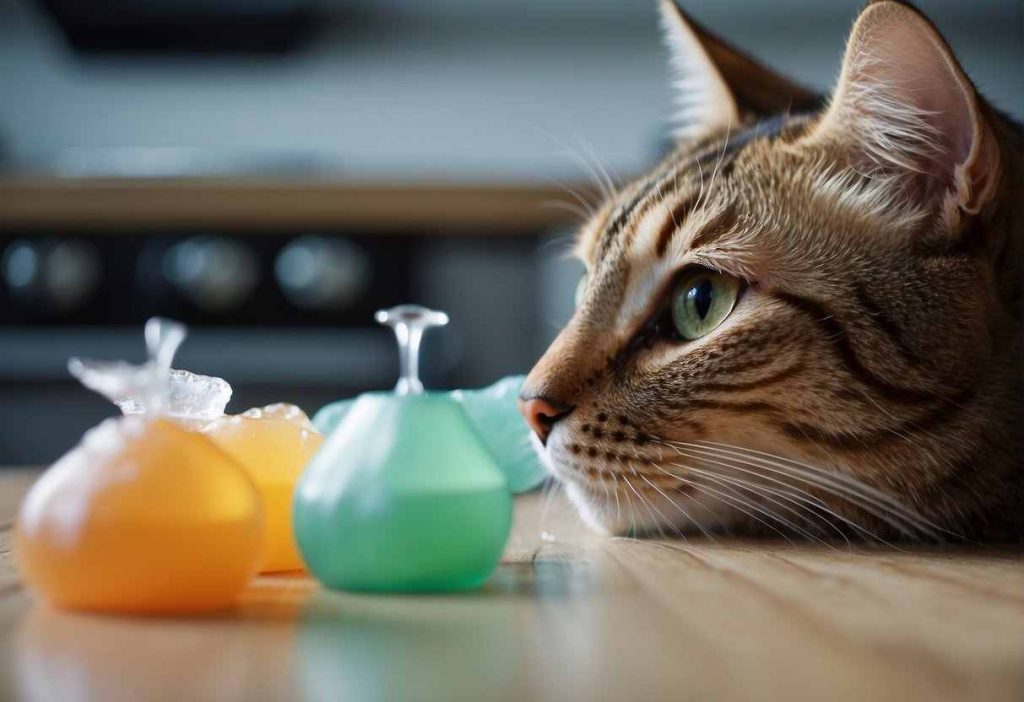
Cat-proofing your home is the key, and I’ve got some practical tips for you.
First off, you might be wondering, “Why does my cat even like soap?” Some cats are attracted to the oily texture or the scent of dish soap, especially those that contain animal-derived fats or oils.
Others might just be curious. Here’s how to steer that curiosity away from soapy danger: If your cat does happen to ingest dish soap, it’s important to act quickly.
Rinse their mouth with warm water using a thin, wet cloth to remove any remaining soap and saliva, and make sure to clean any areas where they may have come into contact with soapy water.
- Safe Storage: Always keep dish soap out of the paw’s reach, preferably in a secure cabinet.
- Switch it Up: Swap out bar soaps for liquid dispensers, making them harder for your cat to lick or carry off.
Looking for a tantalizing alternative? Cats often prefer running water, so consider these suggestions:
- Invest in a cat water fountain to keep them hydrated and entertained. Cats often find the movement of water irresistible, plus it’s a win-win since they’ll be drinking more water!
- Distract with play. Often, cats lick soap out of boredom, so enrich their environment with toys or a window perch.
Remember, the occasional lick won’t harm your cat, but soap isn’t exactly a cat treat. If it becomes a habit, though:
- Check with your vet. You want to ensure there isn’t an underlying issue driving your cat’s behavior.
By following these tips, you’ll help keep your kitty both safe and satisfied. After all, a happy cat means a happy you, right?
So, let’s keep those soap bubbles for dishes only, and maintain a purr-fectly clean, soap-free zone for our whiskered companions!
Safe Cleaning Alternatives
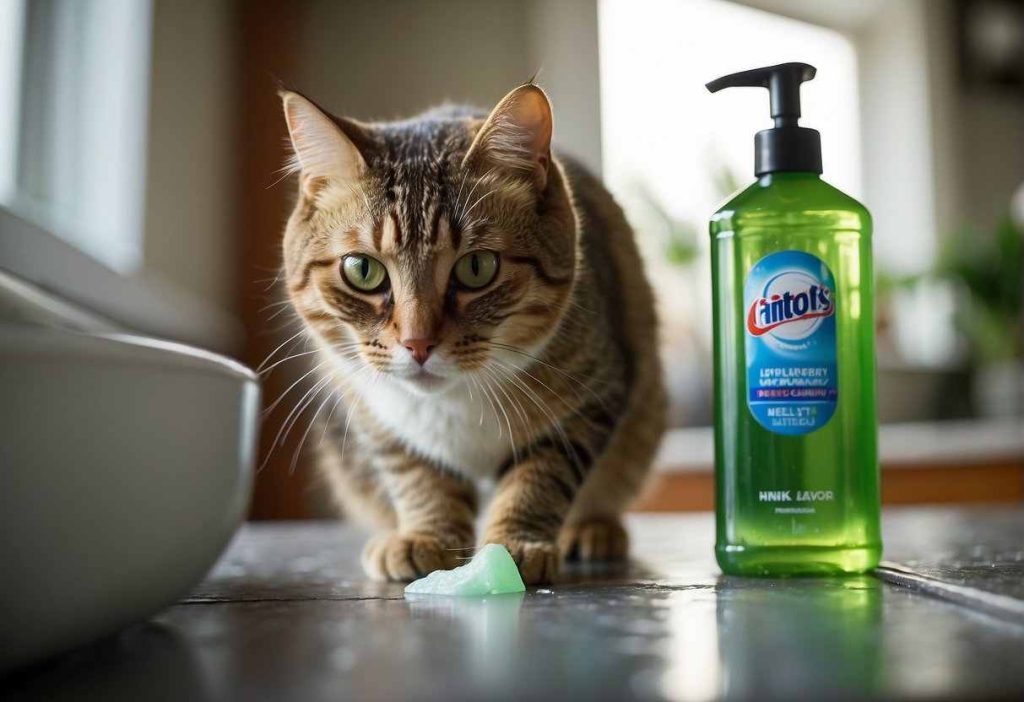
You might be wondering, why go natural? Well, certain ingredients in your standard cleaners can be harmful to your furry pals. What’s the magic trick for picking the right cleaners?
Always, always read the labels – if it’s a no-go for babies, it’s a no-go for kitties too.
Homemade Clean ‘Potions’
Want to be your cat’s hero? Whip up some homemade cleaners! They’re low-cost, easy to make, and—best of all—cat-approved:
- Vinegar & Water: A superhero duo. Mix equal parts and use it anywhere—it’s a cleaning charmer! (5)
- Baking Soda: This isn’t just for cookies! Sprinkle it on carpets before vacuuming for a fresh, clean scent. (6)
Recipe for a Safe, All-Purpose Cleaner
- Mix together:
- ½ cup of white vinegar
- 2 cups of water
- 2 teaspoons of baking soda
- A gentle squeeze of lemon juice (for that zesty smell)
- Pour into a dark-colored spray bottle to maintain the lemon’s superpowers.
- Shake it like you’re mixing a cocktail for your cat’s next party.
List of Safe Ingredients:
- Water (H2O – the essence of life and cleanliness)
- Vinegar (The sour ninja against dirt)
- Baking Soda (The bubbly beast busting grime)
- Lemon Juice (Vitamin C for cleaning, not breakfast)
Remember, each of these is friendly for your kitty’s curious tongue. By using these safe alternatives, you’re not just cleaning; you’re caring!
Keep it simple, keep it safe, and both you and your kitten can enjoy a clean, cheerful home. Ready to be the purrr-fect pet parent? Go forth and clean with confidence, knowing your kitten’s licks are safe!
Don’t forget to also use these safe cleaning alternatives when caring for your new kitten, whether it’s cleaning up after them or using safe products around them.
Reassurance and Support for Cat Owners
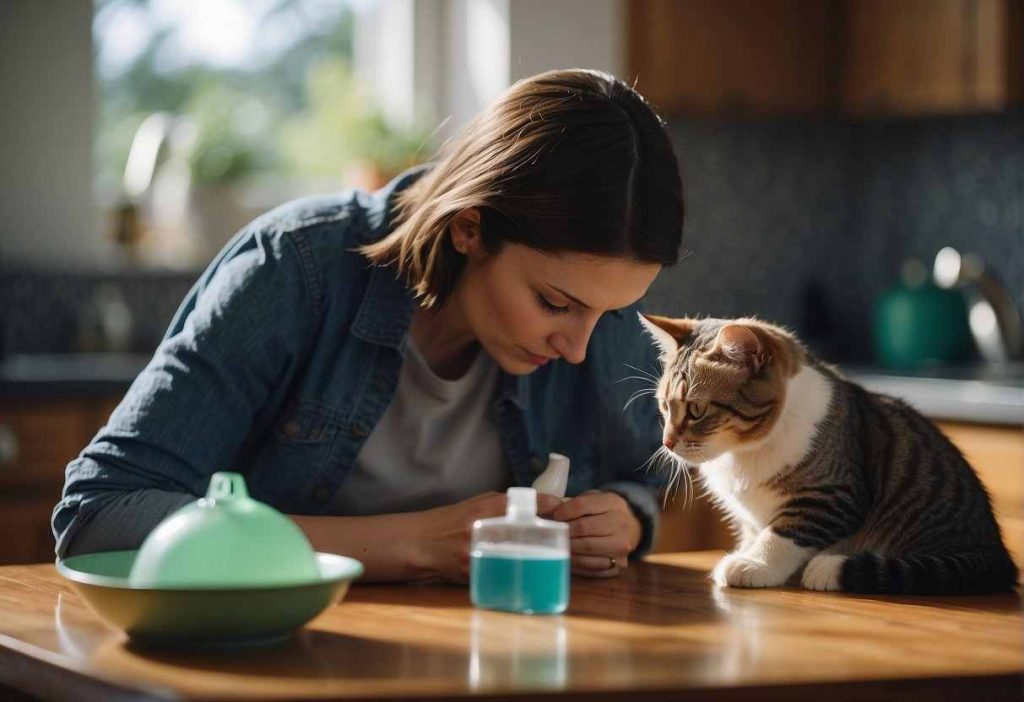
Most household dish soaps are formulated to be non-toxic by default. This means that while it’s not ideal for cats to consume them, it’s unlikely that small amounts will cause serious harm.
However, if you are concerned about your cat’s health, it is always better to be safe than sorry. It would be a good idea to contact the animal poison control line or a local veterinarian for reassurance and support.
Remember, cats can be curious creatures, and a little lick here and there is often just a result of their exploratory nature.
If you notice any concerning symptoms or changes in your cat’s behavior, don’t hesitate to seek advice from a trusted local veterinarian.
- Quick Self-Help Tips: Remove the source: Make sure the dish soap is out of reach to prevent further licking.
- Water is best: Encourage your cat to drink fresh water to help dilute the soap in their system.
Next, keep an eye on your cat. Symptoms like drooling, vomiting, or diarrhea are signs that the body is reacting to an unfamiliar substance and trying to get rid of it. (7)
If these symptoms persist or worsen, or if you know they’ve ingested a large amount, it’s time to call the vet.
Ever heard the story of Whiskers and the Dish Soap? Whiskers was a little tabby who decided that the green liquid in the sink was worth a taste test.
His owner was understandably worried but found reassurance after speaking with their vet from the UK.
Whiskers had a bit of an upset tummy but was back to his audacious self in no time! As a tub owner, it’s important to know that cats are naturally curious and may lick or ingest things that are harmful to them.
If your cat does lick dish soap or any other potentially harmful substances, it’s important to monitor them and seek veterinary advice if necessary.
In summary, while dish soap isn’t a dietary supplement for your cat, accidental consumption doesn’t necessarily spell disaster.
Stay informed, stay calm, and as always, keep an eye on your whiskered friend. They count on you just as much as you count on them.
Quick Recap
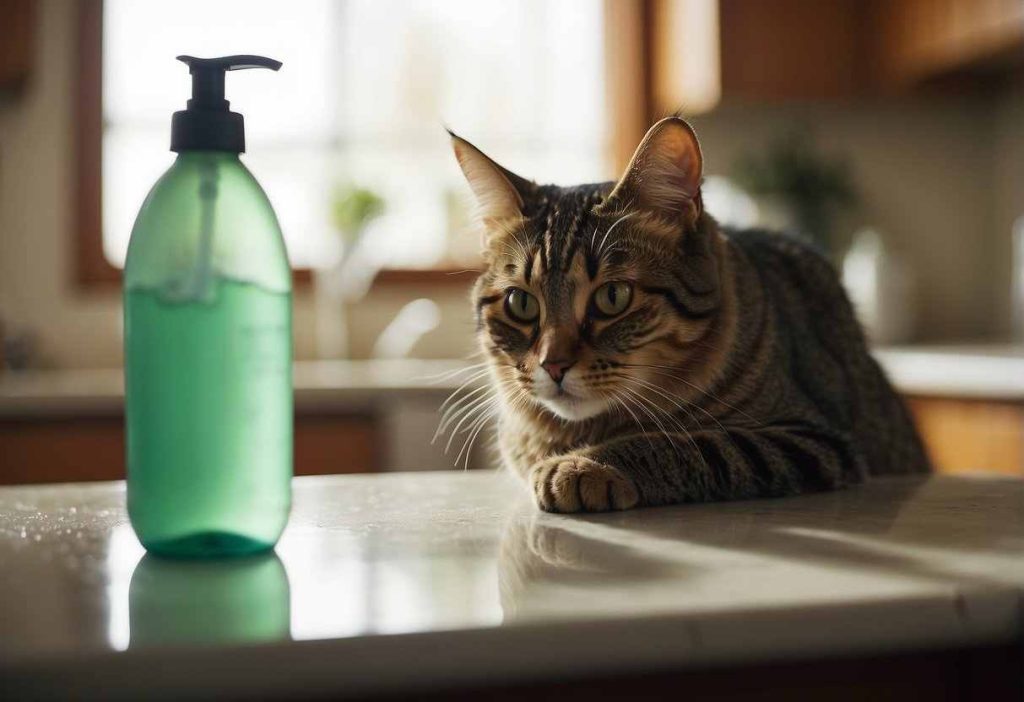
First off, don’t panic! Most liquid dish soaps, like Dawn, are considered non-toxic to cats. A small lick is unlikely to cause serious harm.
However, these soaps can still cause some unpleasant symptoms. Keep an eye out for:
- Drooling
- Nausea
- Vomiting
- Diarrhea
If your cat shows any of these signs, it’s time to take action.
Start by rinsing your cat’s mouth gently with water. If symptoms persist, or if she’s acting more like a lazy lion than her usual pouncing self, then be sure to contact your vet.
Prevention is better than cure, so make it your mission to choose cat-safe cleaning products. And remember, even though they have nine lives, protecting them from one potential mishap could save you a trip to the vet.
Here’s what you might do to keep your cat safe:
- Store cleaning products out of paws’ reach.
- Keep an eye on your cat during and after bathing.
- Rinse thoroughly if you use any soap on their fur.
If this soapy saga has got you worried, don’t hesitate to call your vet for advice tailored to your feline friend. They’re the experts, after all.
Your cat’s health and happiness are paramount, so staying informed and vigilant makes you the superhero in their story. Keep up the good work!
Frequently Asked Questions
Hey there, cat lovers! Ever caught your feline friend in the act of licking dish soap? It’s a quirky situation that raises lots of questions.
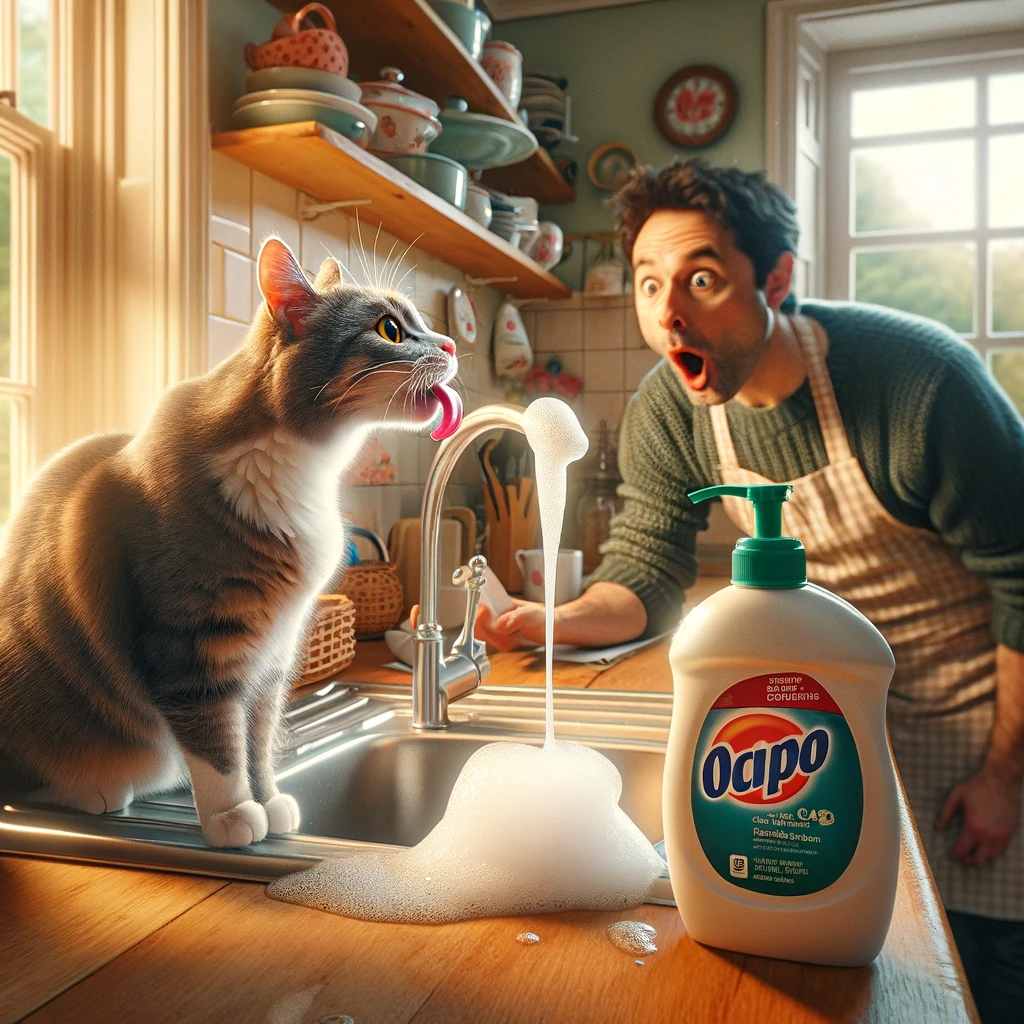
Don’t worry; we’re here to tackle some common concerns you might have if soap and kitty have had an unexpected encounter.
Can Dish Soap Cause Long-Term Health Issues in Cats?
You might be concerned about any long-lasting effects after your cat’s soapy snack.
Generally, dish soap isn’t meant for internal use, and repeated ingestion could potentially lead to gastrointestinal issues or other long-term health problems.
It’s best to keep the dish soap out of your cat’s reach to avoid any risks.
However, if your cat does accidentally ingest dish soap, the best way to prevent any potential health issues is to immediately contact your veterinarian for advice next time you wash your cat.
They can provide guidance on how to safely treat your cat and prevent any further ingestion.
What Are the Signs of Skin Irritation from Dish Soap in Cats?
If you’ve used dish soap on your cat’s skin, look out for signs of irritation such as redness, itchiness, or dry, flaky skin.
Cats have sensitive skin, and some soaps can strip away natural oils, leaving their coat less shiny and their skin irritated.
Are There Any Non-Toxic Dish Soaps Safe for Cats?
You’ll be glad to know that there are pet-friendly, non-toxic dish soaps in the market.
These soaps lack the harsh chemicals found in regular dish soap, making them a safer option if you need to clean something that your cat might lick or come into contact with.
What Should I Do if My Cat Shows Symptoms of Dish Soap Poisoning?
If your cat starts to show symptoms like vomiting, diarrhea, or excessive drooling after ingesting dish soap, it’s definitely a vet visit moment.
Your vet might suggest monitoring at home for mild cases or provide treatment if the symptoms are severe.
How Much Dish Soap is Toxic to Cats?
There’s no precise “safe” amount of dish soap for cats as there is a chance of toxicity with ingesting dish soap.
This can vary with the type and brand of soap, so it’s crucial to prevent any amount of dish soap from being ingested by your cat.
When in doubt, err on the side of caution and consult your vet.
Can I Use Dish Soap to Treat Fleas on My Cat?
Using dish soap as a flea treatment is a home remedy some pet owners turn to.
While dish soap can kill fleas on contact, it’s not the best choice as it can dry out your cat’s skin and isn’t made for their delicate pH balance.
It’s wiser to consult your vet for flea treatment options that are formulated for cats.
Is It Safe to Wash My Cat’s Food and Water Bowls with Dish Soap?
Absolutely, you can use dish soap to clean your cat’s bowls, but make sure to rinse them thoroughly.
No soapy residues should be left behind since you don’t want your furball ingesting even the tiniest bubble during their next meal or water break.

